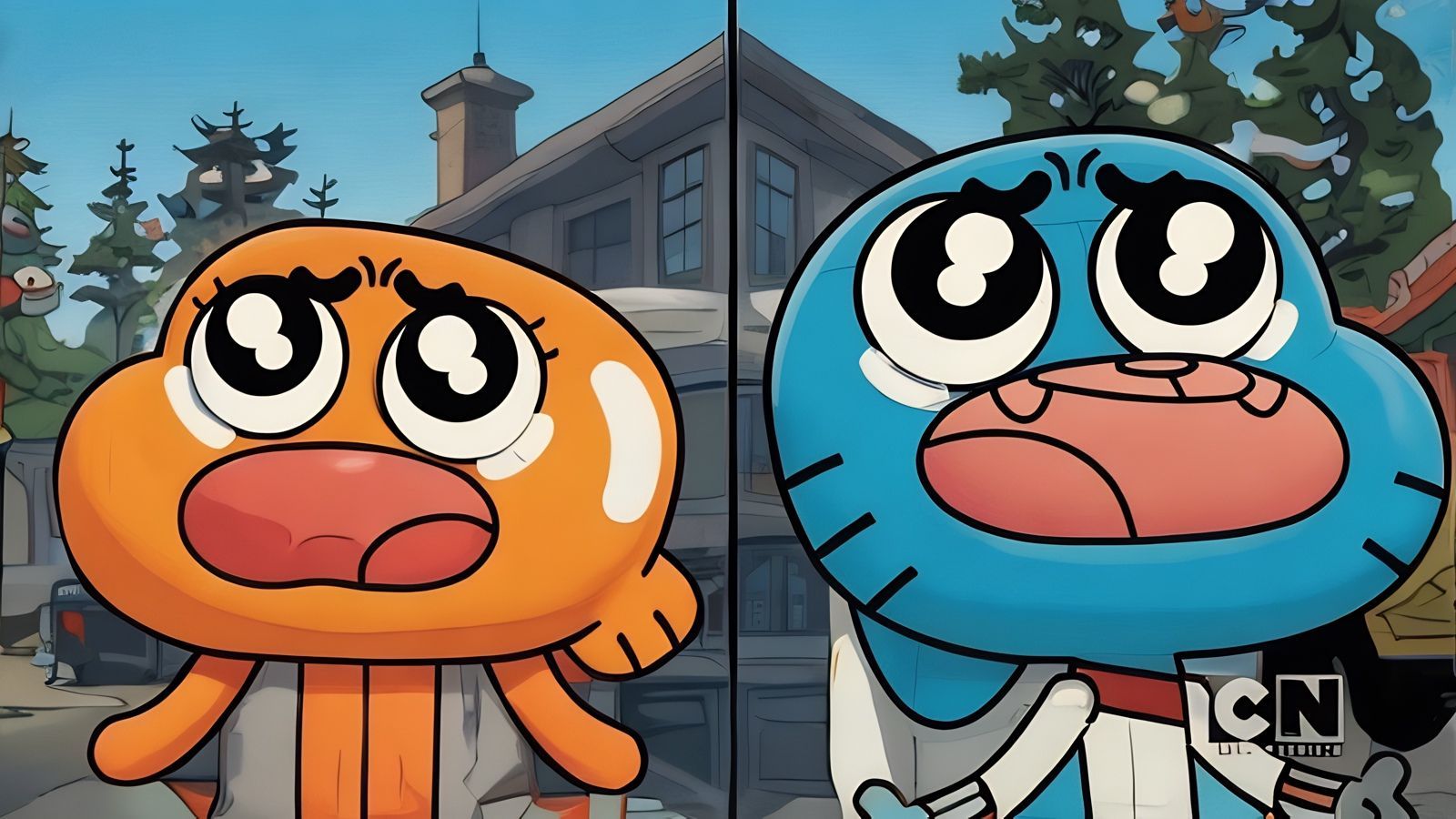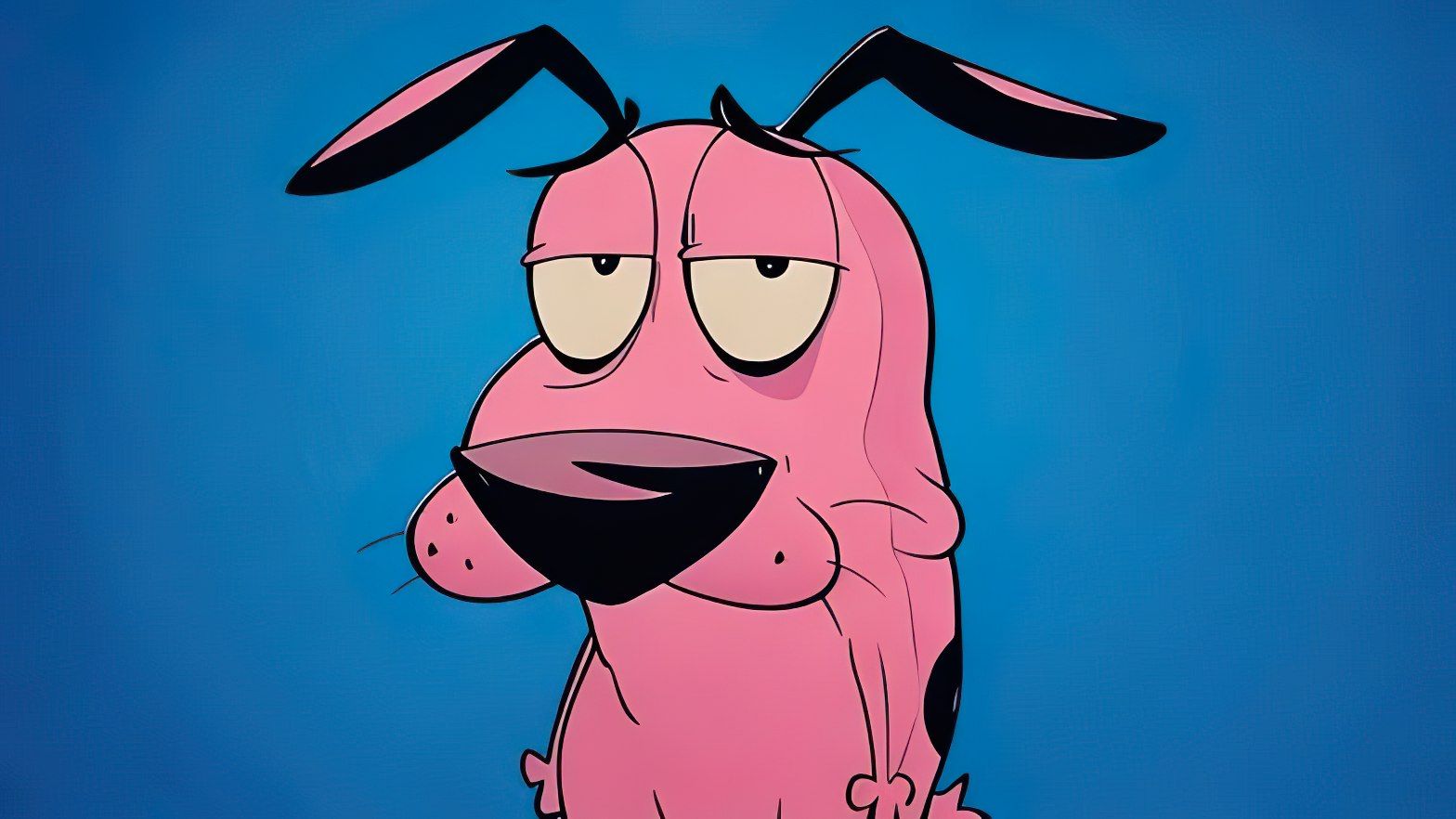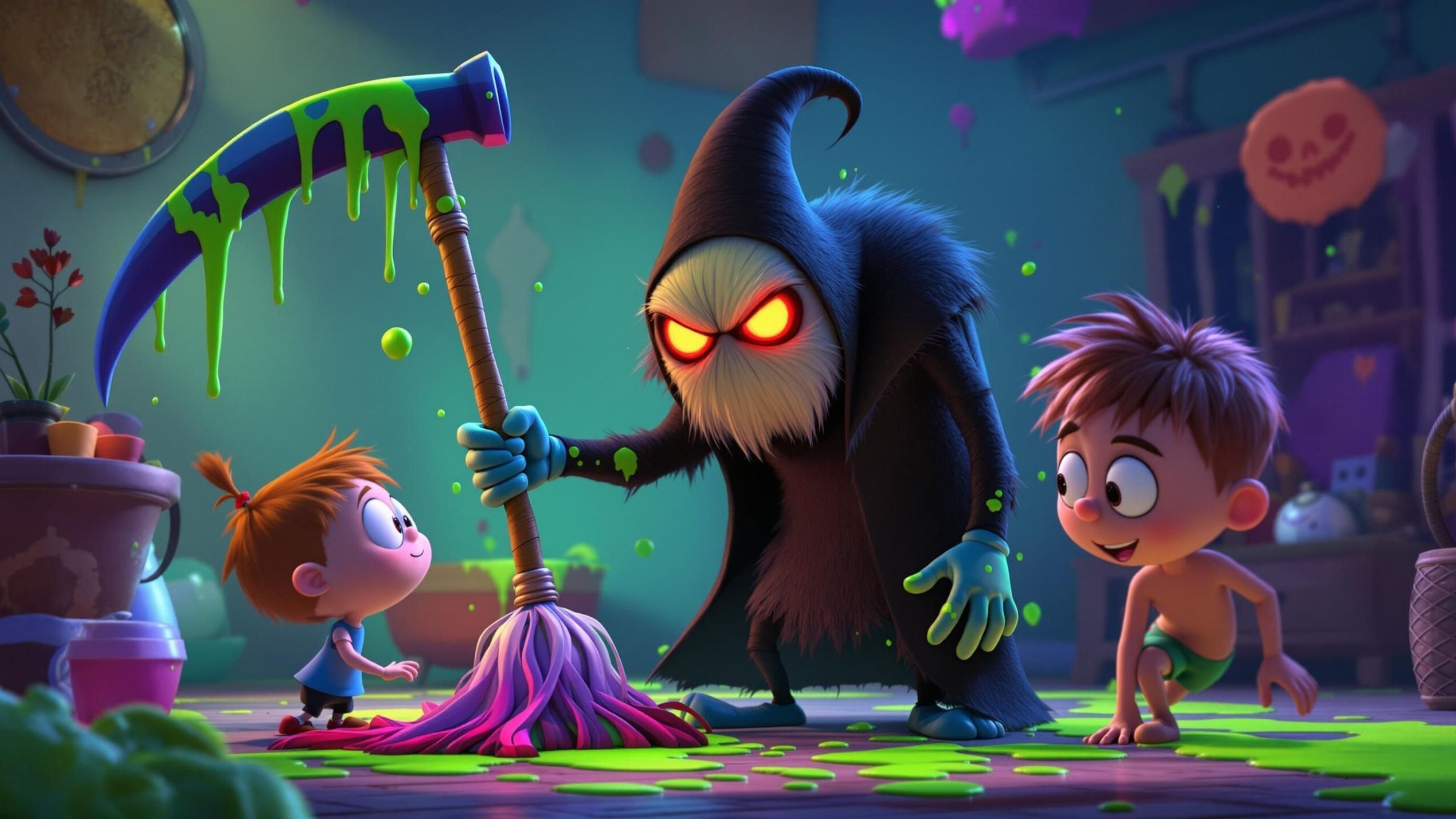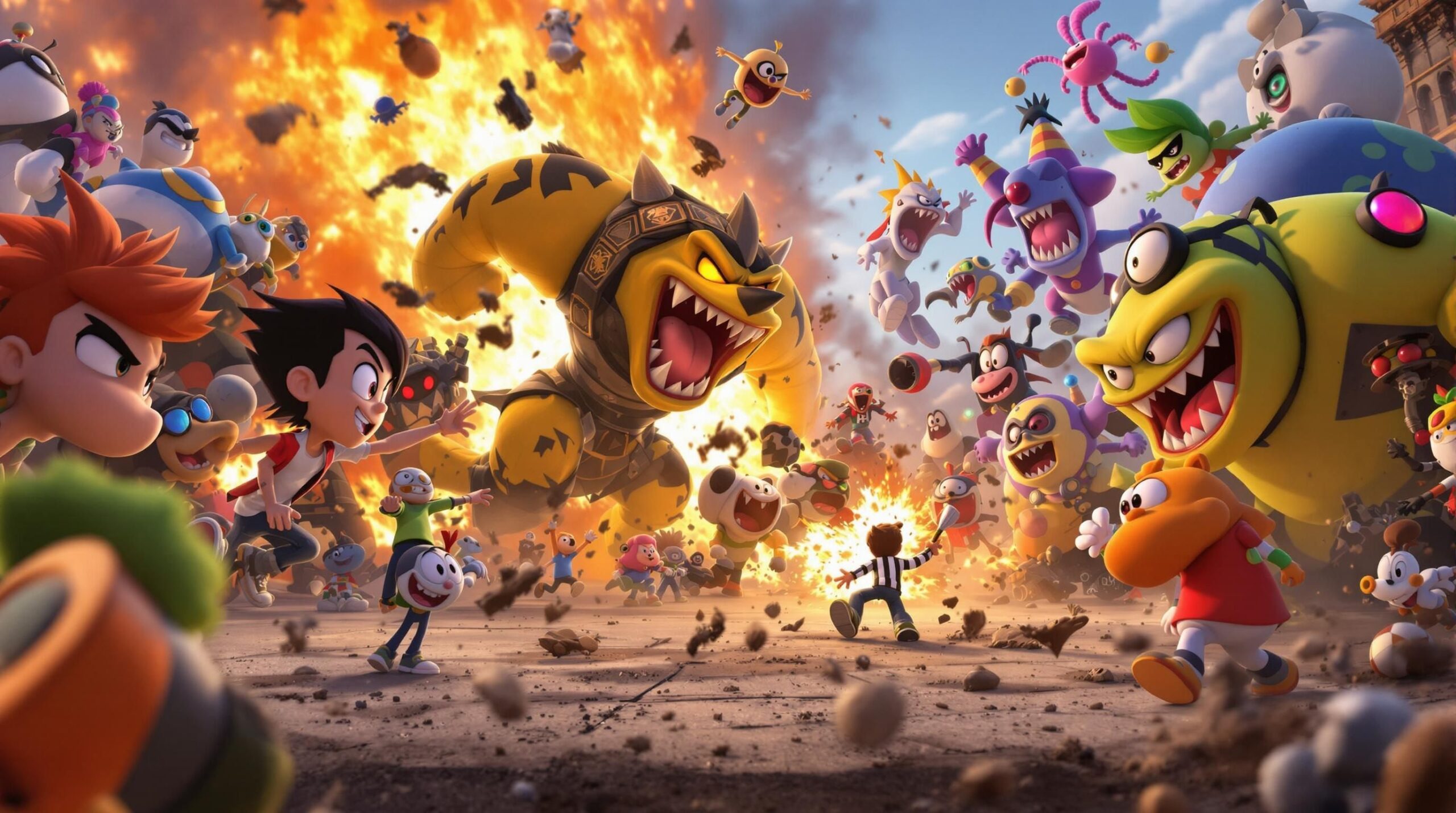When you think of The Amazing World of Gumball, chances are your brain fills with its signature chaos: Darwin’s musical numbers, Banana Joe’s antics, Richard’s ridiculousness, or Gumball himself getting launched into some absurd misadventure. But hidden among the insanity, slapstick, and meme-worthy humor are moments that hit surprisingly hard. We’re talking about the moments that made you pause, feel that lump in your throat, and say, “Wait… why am I feeling feelings right now?” Gumball is a masterclass in emotional whiplash. It lures you in with fart jokes and fourth-wall breaks, then suddenly drops a heartbreaking truth bomb about growing up, friendship, or feeling left behind. Let’s take a journey through the most soul-crushing, tear-jerking, gut-punching episodes you might’ve totally forgotten—but your inner child definitely hasn’t.
When Darwin Wanted to Be Human – The Origins: Part Two
Darwin’s transformation from a simple pet goldfish to Gumball’s best friend is iconic. But remember when he started questioning his place in the Watterson family? In The Origins: Part Two, we see Darwin painfully trying to earn his “humanity,” thinking he has to prove he belongs. Watching him struggle to walk, speak, and be accepted hits differently. His loyalty and need for love is so pure, it’s heartbreaking. The way he sobs, believing he’s not good enough? That’s the kind of emotional trauma only Gumball could wrap in an absurd comedy wrapper.
Banana Joe’s Art – The Drawing
Yes, Banana Joe. The banana who’s usually a living meme. But in The Drawing, his entire personality gets peeled back (pun intended) to reveal something raw. When Gumball and Darwin mock his artwork, they don’t realize how much it means to him. The moment Banana Joe quietly shows them his deeply personal drawing—a portrait of himself, full of emotion and struggle—is unexpected and genuinely sad. For a show that rarely slows down, this one moment reminds us how harsh jokes can sting, and how we never know what someone’s carrying inside.
Rob’s Desperation – The Finale
If The Amazing World of Gumball were a Shakespearean tragedy, Rob would be its tragic villain. Once a background character, Rob becomes the series’ resident antagonist, warped by his memories of the old world. In The Finale, his breakdown is painful to watch. He isn’t evil—he’s just broken, desperate, and trapped in a reality he can’t escape. His final plea as he clings to Gumball and falls into the Void? Chilling. The fear in his voice as he realizes he’ll be forgotten again is some of the darkest stuff ever animated in a cartoon about a blue cat and his goldfish brother.
Penny’s Shell – The Shell
The Shell is one of the most emotionally raw episodes of the entire series. Gumball finally confesses his love to Penny, but it’s more than a love story. It’s about vulnerability—literally. Penny breaking free of her shell is symbolic and scary. She fears rejection, fears being seen for who she really is. And Gumball? He’s so floored by her true form that he messes it up at first. But when he makes it right, the two embrace in this surreal, magical moment that feels like a Studio Ghibli fever dream. It’s the kind of strange, beautiful sadness you can’t explain but totally feel.
The Rejected Birthday Invite – The Choices
Nicole Watterson has always been a powerhouse—a workaholic, overprotective, high-functioning ball of anxiety. But The Choices gives us a rare look into her past. In a split-second memory, we see her as a child, walking into an empty birthday party alone with a sad little gift. The camera lingers just long enough to punch you in the gut. No words, just a silent image of rejection. It’s a masterclass in storytelling—and emotional damage.
Darwin Gets Heartbroken – The Girlfriend
Darwin is usually sunshine in aquatic form. But in The Girlfriend, he falls hard for Rachel, and then promptly gets ghosted when she graduates. He goes full heartbreak mode—classic emo haircut, eating ice cream, crying in the rain (with actual thunder and dramatic music, of course). While it’s exaggerated, it’s also painfully relatable. Who hasn’t crushed hard and felt the sting of not being noticed? For Darwin, it’s his first real heartbreak—and we’re right there with him, crying into our imaginary Ben & Jerry’s.
Leslie’s Loneliness – The Flower
Leslie might be one of the most underappreciated characters in the show, but The Flower reveals a more melancholy side of this floral friend. When Gumball and Darwin think he’s evil, they ostracize him, and he starts to genuinely question his identity. Leslie’s soft voice and poetic nature hide a deep desire for connection and understanding. Watching him wilt (literally and figuratively) under the weight of rejection makes you realize how even side characters carry their own silent battles.
The Truth About Richard – The Parents
You’d think Richard Watterson is just a walking joke—a man-child whose brain is made of waffles. But The Parents hits you with something unexpectedly heavy: his parents never wanted him. That reveal, tucked into an otherwise ridiculous plot, lands like a bomb. Suddenly, Richard’s arrested development and desperate need for love make sense. It’s tragic in the quietest way. He just wanted to be wanted—and instead of dealing with it, he became a clown to protect himself.
Anais Isn’t a Kid – The Genius
Anais is the smartest Watterson by far, but in The Genius, her intellect isolates her. While her family fumbles through life, she’s solving equations and quietly watching everything crumble. It all builds to a sad realization: being a genius doesn’t mean you’re happy. She wants to be a kid, to laugh and play and be silly. But often, she’s the one cleaning up everyone’s messes. Watching her struggle to balance being the “adult” while missing out on childhood is heartbreakingly real.
The Forgotten Memories – The Puppets
There’s something haunting about The Puppets. Gumball and Darwin get taken over by creepy puppet versions of themselves, but underneath the creep factor is something deeper—this episode is about lost identity. When they begin to forget who they are, it feels like a metaphor for losing yourself to expectation or external control. The eeriness of their slow, puppet-like transformation, paired with their confusion and fear, creates a surreal sadness that lingers way past the credits.
Gumball’s Existential Crisis – The Copycats
Gumball meeting his Chinese bootleg counterpart is hilarious at first—until it’s not. As the characters slowly realize they’re being replaced, erased, and imitated beyond recognition, things get… weirdly emotional. There’s an underlying fear of losing uniqueness, of being misunderstood, of becoming irrelevant. Watching Gumball desperately try to prove he’s more than a clone is funny, yes—but also a sobering commentary on identity in a world that wants to mass-produce and simplify everything.
Tobias’s Breakdown – The Extras
Even the loudest characters have their breaking points. In The Extras, Tobias, who’s usually just background noise, lashes out in a painfully relatable meltdown. Tired of being a side character, he snaps. His desperate need to be seen and validated echoes a universal insecurity: “Do I matter?” His over-the-top tantrum is equal parts hilarious and tragic. He just wants a plot. A moment. To be more than filler. Haven’t we all felt like Tobias at some point?
Carrie’s Lost Love – The Ghost
Carrie, our resident goth ghost, is often floating in and out of the background (literally). But in The Ghost, we get a rare glimpse into her loneliness. The episode explores how being dead doesn’t mean being emotionless. She longs for connection, for someone to see her. When Darwin finally reaches out to her, it’s this beautiful, sad little moment of recognition—like two souls finally finding each other in the static.
Gumball’s Regret – The Choices
Yep, this episode deserves a double mention. Because this time, it’s about Gumball. At one point, Nicole imagines what life would be like if she hadn’t kept him—and we see a reality where Gumball never existed. The vision is chilling. No laughter, no chaos, no love. And while it’s just a possibility, the mere idea that he could’ve never been born hits like a truck. It’s a reminder of how fragile and meaningful every choice truly is.
When the Credits Rolled – The Inquisition
And finally, the ultimate sad moment: when it felt like the end. The Inquisition doesn’t just parody school reform—it transforms Elmore Junior High into a grayscale, soulless void. Characters get “normalized,” stripped of everything that makes them unique. When Gumball and Darwin realize what’s happening, it feels like the show itself is under threat. Watching your favorite zany characters lose their identities, one by one, is like watching your childhood dissolve. Then, the screen fades to black… and it feels like goodbye.
Gumball’s Tragic Genius
So yeah, The Amazing World of Gumball might be one of the funniest shows ever made—but don’t let the absurdity fool you. Beneath the chaos are profound stories of heartbreak, identity, loneliness, and love. It sneaks in sadness like a ninja wrapped in a joke burrito, and before you know it, you’re crying at a talking banana or a ghost girl’s longing for affection.
The show never shouts its sadness. It whispers it. And those whispers stay with you long after the credits roll.




